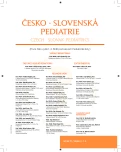-
Medical journals
- Career
Nonketotic hyperglycinemia: a case of a serious congenital hypotonia diagnosed by magnetic resonance
Authors: J. Dušek 1; A. Sjöström 1; J. Žižka 2
Authors‘ workplace: Department of Neonatology, University Hospital of Northern Sweden, Umeå 1; Department of Radiology, University Hospital of Northern Sweden, Umeå a Radiologická klinika Fakultní nemocnice Hradec Králové 2
Published in: Čes-slov Pediat 2016; 71 (2): 87-90.
Category: Case Report
Overview
Nonketotic hyperglycinemia: a case of a serious congenital hypotonia diagnosed by magnetic resonance
The authors present a case report of a full-term newborn with symptoms of hypotonia progressing into respiratory insufficiency with the need of artificial pulmonary ventilation.
Within the complex of diagnostic tests, magnetic resonance imaging and spectroscopy was performed and the diagnosis of nonketotic hyperglycinemia was suggested and finally confirmed by metabolic tests and eventually by DNA analysis.
The authors describe this congenital metabolic disease which is rare and with an unsatisfactory prognosis. Etiology, clinical course, therapy and prognosis of this rare entity are discussed. The value of non-invasive diagnosis by means of magnetic resonance is highlighted.Key words:
nonketotic hyperglycinemia, magnetic resonance imaging – MRI, magnetic resonance spectroscopy – MRS, metabolic inbornerrors
Sources
1. Aliefendioğlu D, Tana Aslan Ay, Coşkun T, et al. Transient nonketotic hyperglycinemia: two case reports and literature review. Pediatr Neurol 2003; 28 : 151–155.
2. Applegarth DA, Toone JR. Glycine encephalopathy (nonketotic hyperglycinaemia): review and update. J Inherit Metab Dis 2004; 27 : 417–422.
3. Baker PR 2nd, Friederich MW, Swanson MA, et al. Variant nonketotic hyperglycinemia is caused by mutations in LIAS, BOLA3 and the novel gene GLRX5. Brain 2014; 137 : 366–379.
4. Brunel-Guitton C, Casey B, Coulter-Mackie M, et al. Late-onset nonketotic hyperglycinemia caused by a novel homozygous missense mutation in the GLDC gene. Mol Genet Metab 2011; 103 : 193–196.
5. Cusmai R, Martinelli D, Moavero R, et al. Ketogenic diet in early myoclonic encephalopathy due to nonketotic hyperglycinemia. Eur J Paediatr Neurol 2012; 16 : 509–513.
6. Dinopoulos A, Matsubara Y, Kure S. Atypical variants of nonketotic hyperglycinemia. Mol Genet Metab 2005; 86 : 61–69.
7. Gerritsen T, Kaveggia E, Waisman HA. A new type of idiopathic hyperglycinemia with hypo-oxaluria. Pediatrics 1965; 36 : 882–891.
8. Hennermann JB, Berger JM, Grieben U, et al. Prediction of long-term outcome in glycine encephalopathy: a clinical survey. J Inherit Metab Dis 2012; 35 : 253–261.
9. Hoover-Fong JE, Shah S, Van Hove JL, et al. Natural history of nonketotic hyperglycinemia in 65 patients. Neurology 2004; 63 : 1847–1853.
10. Kanekar S, Byler D. Characteristic MRI findings in neonatal nonketotic hyperglycinemia due to sequence changes in GLDC gene encoding the enzyme glycine decarboxylase. Metab Brain Dis 2013; 28 : 717–720.
11. Keating JP, Feigin RD, Tenenbaum SM, Hillman RE. Hyperglycinemia with ketosis due to a defect in isoleucine metabolism: A preliminary report. Pediatrics 1972; 50 : 890–895.
12. Kure S, Kato K, Dinopoulos A, et al. Comprehensive mutation analysis of GLDC, AMT, and GCSH in nonketotic hyperglycinemia. Hum Mutat 2006; 27 : 343–352.
13. Lang TF, Parr JR, Matthews EE, et al. Practical difficulties in the diagnosis of transient non-ketotic hyperglycinaemia. Dev Med Child Neurol 2008; 50 : 157–159.
14. Mabry CC, Karam FA. Idiopathic hyperglycinemia and hyperglycinuria. Sth Med J 1963; 56 : 1444.
Labels
Neonatology Paediatrics General practitioner for children and adolescents
Article was published inCzech-Slovak Pediatrics

2016 Issue 2-
All articles in this issue
- Psychosocial aspects of inflammatory bowel disease in children
- Schools in hospitals and other medical facilities
- Measurement of nasal nitric oxide in children – first experiences
- What disease can be hidden behind a diagnosis of atypical cystic fibrosis?
- Nonketotic hyperglycinemia: a case of a serious congenital hypotonia diagnosed by magnetic resonance
- Deep venous thrombosis in a child with nephrotic syndrome – case report
- Bizzare erruption on the skin
- Shiga toxin-producing Escherichia coli infections in children
- Diagnostics of primary ciliary dyskinesia
- Primary biphasic synovial sarcoma of tongue in an infant: Report of rare case and review of the literature
- Czech-Slovak Pediatrics
- Journal archive
- Current issue
- Online only
- About the journal
Most read in this issue- Shiga toxin-producing Escherichia coli infections in children
- What disease can be hidden behind a diagnosis of atypical cystic fibrosis?
- Nonketotic hyperglycinemia: a case of a serious congenital hypotonia diagnosed by magnetic resonance
- Schools in hospitals and other medical facilities
Login#ADS_BOTTOM_SCRIPTS#Forgotten passwordEnter the email address that you registered with. We will send you instructions on how to set a new password.
- Career

